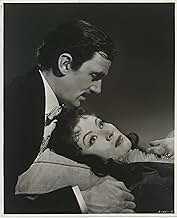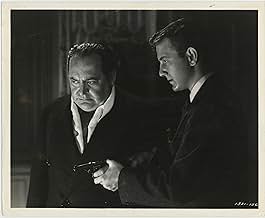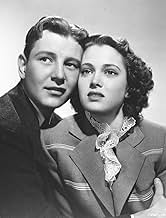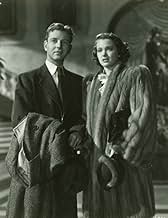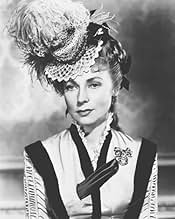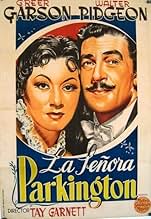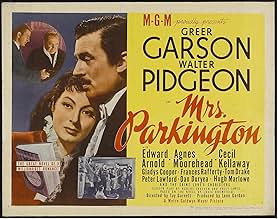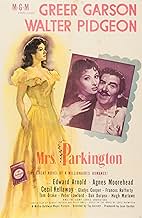VALUTAZIONE IMDb
7,0/10
1974
LA TUA VALUTAZIONE
Aggiungi una trama nella tua linguaA widowed matriarch reminisces about her family fortunes, including her romance with a financier/mine owner.A widowed matriarch reminisces about her family fortunes, including her romance with a financier/mine owner.A widowed matriarch reminisces about her family fortunes, including her romance with a financier/mine owner.
- Regia
- Sceneggiatura
- Star
- Candidato a 2 Oscar
- 4 vittorie e 3 candidature totali
St. Luke's Episcopal Church Choristers
- Carolers
- (as Saint Luke's Choristers)
Recensioni in evidenza
This was an entertaining movie, told in both contemporary time and flashback, as Susie Parkington (Greer Garson) recalls her life with her late husband, Augustus (Walter Pidgeon), while dealing with a family crisis that involves all her self-centered children, grandchildren, in-laws and her beloved great-granddaughter, who adds substance to the shallow brood.
Greer is terrific and the character she plays is admirable and likeable, but the same can't be said for Walter, as Augustus can't be called admirable. He's got an ego to match his bank account as well as a vengeful streak that borders on obsessive. Despite being a young, innocent woman (as well as his social inferior) when they wed (he felt responsible for her, as the mining accident he indirectly caused resulted in her mother's death) she manages to hold her own against this strong, often domineering man, like when she confesses to lending financial help to the family of a business rival he sought to destroy. She also stands her ground when it comes to Aspasia (Agnes Moorehead), Augustus's former mistress, who becomes Susie's friend, though still in love with her husband. Later down the road, after a year's separation caused by a family tragedy, Susie follows Augustus to Europe, where she wins him back from another woman, with help from the Prince of Wales! She's more than a match for the husband who called her "Sparrow"!
There are other familiar faces here: Edward Arnold, Dan Duryea, Cecil Kellaway, that add to the story, though I would have been just as happy had the present-day clan been left out altogether.
Greer is terrific and the character she plays is admirable and likeable, but the same can't be said for Walter, as Augustus can't be called admirable. He's got an ego to match his bank account as well as a vengeful streak that borders on obsessive. Despite being a young, innocent woman (as well as his social inferior) when they wed (he felt responsible for her, as the mining accident he indirectly caused resulted in her mother's death) she manages to hold her own against this strong, often domineering man, like when she confesses to lending financial help to the family of a business rival he sought to destroy. She also stands her ground when it comes to Aspasia (Agnes Moorehead), Augustus's former mistress, who becomes Susie's friend, though still in love with her husband. Later down the road, after a year's separation caused by a family tragedy, Susie follows Augustus to Europe, where she wins him back from another woman, with help from the Prince of Wales! She's more than a match for the husband who called her "Sparrow"!
There are other familiar faces here: Edward Arnold, Dan Duryea, Cecil Kellaway, that add to the story, though I would have been just as happy had the present-day clan been left out altogether.
Greer Garson got an Oscar nomination for one of her best roles in Mrs. Parkington. Though the film is one that had her co-starring with her favorite leading man, the film is all Greer.
Like Maytime the film starts with Greer as the aged family matriarch of the Parkington family during Christmas of 1938. Her husband who died many years ago was Walter Pidgeon and the family has gathered once again. But there's a crisis brewing. Her grandson-in-law Edward Arnold has embezzled a ton of money in some bad market speculation. His daughter Frances Rafferty and Garson's great granddaughter additionally has a romantic problem, she's torn between her fiancé Tom Drake who is whistleblowing on Arnold and family loyalty.
During the evening Garson reminisces back to certain crisis times in her own marriage and it eventually tells her what she must do in this situation. I will say this about the Parkingtons, Garson's the genuine article, the rest of them are a spoiled and selfish lot, only Rafferty seems to have escaped the taint.
I have to say it was a little strange seeing the much older Gladys Cooper playing the daughter of the heavily made up Greer Garson, still both actresses are professional enough to make it convincing. There's a wonderful performance by Cecil Kellaway as the Prince of Wales during the Gay Nineties when Parkingtons are in Europe. Kellaway may be the Prince of Wales, but he proves to be real sharp in terms of human relations and delicately removes a bump in the road of the Parkington marriage.
Agnes Moorehead got a Supporting Actress nomination for Mrs. Parkington in the role of an impoverished French aristocrat who becomes friend and confidante of Garson. She gives Garson a lot of sage advice. She lost to Ethel Barrymore for None But The Lonely Heart and Garson lost her race for Best Actress to Ingrid Bergman in Gaslight.
Mrs. Parkington remains however one of MGM's best films of the Forties. The influence of Maytime and of Citizen Kane in the telling of the Parkington family story is obviously apparent. And the message about both inherited wealth and the damage that mere speculation without creating could have come from Wall Street. For Greer Garson and Walter Pidgeon fans a must.
Like Maytime the film starts with Greer as the aged family matriarch of the Parkington family during Christmas of 1938. Her husband who died many years ago was Walter Pidgeon and the family has gathered once again. But there's a crisis brewing. Her grandson-in-law Edward Arnold has embezzled a ton of money in some bad market speculation. His daughter Frances Rafferty and Garson's great granddaughter additionally has a romantic problem, she's torn between her fiancé Tom Drake who is whistleblowing on Arnold and family loyalty.
During the evening Garson reminisces back to certain crisis times in her own marriage and it eventually tells her what she must do in this situation. I will say this about the Parkingtons, Garson's the genuine article, the rest of them are a spoiled and selfish lot, only Rafferty seems to have escaped the taint.
I have to say it was a little strange seeing the much older Gladys Cooper playing the daughter of the heavily made up Greer Garson, still both actresses are professional enough to make it convincing. There's a wonderful performance by Cecil Kellaway as the Prince of Wales during the Gay Nineties when Parkingtons are in Europe. Kellaway may be the Prince of Wales, but he proves to be real sharp in terms of human relations and delicately removes a bump in the road of the Parkington marriage.
Agnes Moorehead got a Supporting Actress nomination for Mrs. Parkington in the role of an impoverished French aristocrat who becomes friend and confidante of Garson. She gives Garson a lot of sage advice. She lost to Ethel Barrymore for None But The Lonely Heart and Garson lost her race for Best Actress to Ingrid Bergman in Gaslight.
Mrs. Parkington remains however one of MGM's best films of the Forties. The influence of Maytime and of Citizen Kane in the telling of the Parkington family story is obviously apparent. And the message about both inherited wealth and the damage that mere speculation without creating could have come from Wall Street. For Greer Garson and Walter Pidgeon fans a must.
Greer Garson and Walter Pigeon were one of the great romantic teams of the 1940s but both were too old (particularly Pigeon) for their roles in this disappointing film version of the popular Louis Bromfield novel. Pigeon is simply miscast; he is too much the gentleman to ever be convincing as the boorish, philandering Major "Gus" Parkington. As his wife, Susie, Garson, wearing a dark wig (and looking rather like Yvonne DeCarlo), ages from a naive young woman to the crusty, 84 year old family matriarch. The characterization is never believable but her scenes as the elderly Mrs. Parkington are especially objectionable (she's too arch). Neither Garson or Pigeon is particularly well-aided by a meandering script that fails to adequately clarify the relationships among the family members or takes the time to develop the various characters. Consequently, one simply doesn't care what happens to the members of the Parkington dynasty. The supporting cast...among them, Edward Arnold, Lee Patrick, Dan Duryea, Cecil Kellaway, Frances Rafferty and Tom Drake...is competent but only Agnes Moorehead, in a rare sympathetic turn as Pigeon's ex-mistress, and Gladys Cooper, as Pigeon and Garson's dypsomaniacal daughter, manage to make a significant impression.
"Mrs. Parkington" is an incredibly well made film--with great acting and some lovely production values. Clearly, MGM gave this film the full glossy studio treatment. And, for her wonderful performance, Greer Garson was nominated for an Oscar. However, I am very ambivalent about the film because so many of the characters are either despicable or pathetic. In many ways, it reminds me of the country music song "Stand By Your Man"--as a woman should put up with ANYTHING in order to keep even the most awful man. Clearly, this is a film for dependent personalities!
The film begins near the present time. The Parkington family appears to be made up of a group of sociopaths--all loathsome jerks who think mostly of themselves. When the matriarch, Mrs. Parkington (Garson) learns that one of the brood is a thief, she begins to reminisce--remembering her life with Mr. Parkington (Walter Pidgeon). At first, their marriage seems pretty nice--with a rich and doting husband. However, through the course of these long series of flashbacks, you learn that Mr. Parkington is vindictive, petty, selfish and cheats on Mrs. Parkington. And, as for Mrs. Parkington, she is clever and long-suffering--and lifted up as some sort of shining example. I couldn't help but think she was pathetic and would have probably accepted Mr. Parkington back after he murdered or slept with children or sheep. And this brings me to my ambivalence--no one--not anyone in this family is likable in the least. And, the film seems to promote the notion that a woman's job is just to put up with this and smile throughout! Talk about an anti-feminist message! The bottom line is that I'd hate for my daughters to watch such a film, as I'd hate to think that Mrs. Parkington is someone to admire (though the film tries HARD to say this). If Garson's character had either shot her husband or left him and bled him dry in alimony, then maybe I would have enjoyed it much more. A great job of acting and a sick message to this film.
Oh, and I should mention that in one brief scene, the Parkingtons joke about how it is Mr. Parkington's job to regularly 'thrash his wife'. Wow....need I say any more?! Well, yes. If you like films that promote women as lovely doormats, also try Mary Pickford's last film, "Secrets". Her husband is also a piece of work and she looks back fondly to their lives together.
The film begins near the present time. The Parkington family appears to be made up of a group of sociopaths--all loathsome jerks who think mostly of themselves. When the matriarch, Mrs. Parkington (Garson) learns that one of the brood is a thief, she begins to reminisce--remembering her life with Mr. Parkington (Walter Pidgeon). At first, their marriage seems pretty nice--with a rich and doting husband. However, through the course of these long series of flashbacks, you learn that Mr. Parkington is vindictive, petty, selfish and cheats on Mrs. Parkington. And, as for Mrs. Parkington, she is clever and long-suffering--and lifted up as some sort of shining example. I couldn't help but think she was pathetic and would have probably accepted Mr. Parkington back after he murdered or slept with children or sheep. And this brings me to my ambivalence--no one--not anyone in this family is likable in the least. And, the film seems to promote the notion that a woman's job is just to put up with this and smile throughout! Talk about an anti-feminist message! The bottom line is that I'd hate for my daughters to watch such a film, as I'd hate to think that Mrs. Parkington is someone to admire (though the film tries HARD to say this). If Garson's character had either shot her husband or left him and bled him dry in alimony, then maybe I would have enjoyed it much more. A great job of acting and a sick message to this film.
Oh, and I should mention that in one brief scene, the Parkingtons joke about how it is Mr. Parkington's job to regularly 'thrash his wife'. Wow....need I say any more?! Well, yes. If you like films that promote women as lovely doormats, also try Mary Pickford's last film, "Secrets". Her husband is also a piece of work and she looks back fondly to their lives together.
Greer Garson and Walter Pidgeon turn in fine performances here, in fact, they're as good here as in any of their films. Garson has long been a favorite of mine, and I particularly revere her performance in "Random Harvest". This film isn't quite that good, but it is a gem.
Of particular interest here are two very unusual performances by supporting actors. When I read, in advance, that Agnes Moorehead played a French socialite...well, I just couldn't see it. But, she was wonderful, and this is an Agnes Moorehead you've never seen before! And Cecil Kellaway as Edward, Prince of Wales...again, a very different performance, and so well done.
The story itself is interesting, with Garson as an old family institution reflecting on her life. If there's a criticism about this film, it's that Garson looks too young even in her elderly makeup. But, for much of the movie, she's her usual alluring self. Is it a sentimental melodrama? Yes. But a delightful one.
Of particular interest here are two very unusual performances by supporting actors. When I read, in advance, that Agnes Moorehead played a French socialite...well, I just couldn't see it. But, she was wonderful, and this is an Agnes Moorehead you've never seen before! And Cecil Kellaway as Edward, Prince of Wales...again, a very different performance, and so well done.
The story itself is interesting, with Garson as an old family institution reflecting on her life. If there's a criticism about this film, it's that Garson looks too young even in her elderly makeup. But, for much of the movie, she's her usual alluring self. Is it a sentimental melodrama? Yes. But a delightful one.
Lo sapevi?
- QuizUnusual for a film even today, the movie was shot in chronological order.
- BlooperThe gypsy fiddler plays Johann Strauss's "Roses from the South" on violin in a scene set in 1872, but that music was written in 1880.
- Citazioni
Susie 'Sparrow' Parkington: Why did you marry me?
Major Augustus Parkington: Life was too simple without you.
- Versioni alternativeIn the European released version, Cecil Kellaway was replaced by 'Hugo Haas' and the role was changed to "Balkan King." Also, Tala Birell's character was changed to simply "Countess" instead of "Lady Norah Ebbsworth." Three actors in casting call lists but who were not in the U.S. print (Ann Codee, George Davis and Frank Reicher may also have been in this version (see the trivia section.)
- ConnessioniFeatured in Twenty Years After (1944)
- Colonne sonoreI'll Take You Home Again, Kathleen
(1876) (uncredited)
Music by Thomas Payne Westendorf
Played extensively in the score, mostly as a love theme
I più visti
Accedi per valutare e creare un elenco di titoli salvati per ottenere consigli personalizzati
Everything New on HBO Max in August
Everything New on HBO Max in August
Looking for something different to add to your Watchlist? Take a peek at what movies and TV shows are coming to HBO Max this month.
- How long is Mrs. Parkington?Powered by Alexa
Dettagli
- Data di uscita
- Paese di origine
- Lingua
- Celebre anche come
- La señora Parkington
- Luoghi delle riprese
- Morrison Ranch, Agoura, California, Stati Uniti(fox hunt sequence)
- Azienda produttrice
- Vedi altri crediti dell’azienda su IMDbPro
- Tempo di esecuzione
- 2h 4min(124 min)
- Colore
- Proporzioni
- 1.37 : 1
Contribuisci a questa pagina
Suggerisci una modifica o aggiungi i contenuti mancanti


